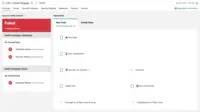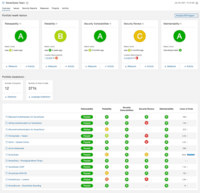Overview
What is SonarQube?
SonarQube is a code quality and vulnerability solution for development teams that integrates with CI/CD pipelines to ensure the software you produce is secure, reliable, and maintainable.
Awards
Products that are considered exceptional by their customers based on a variety of criteria win TrustRadius awards. Learn more about the types of TrustRadius awards to make the best purchase decision. More about TrustRadius Awards
Pricing
Community
Free
Developer EDITION
Starts at $160
Enterprise EDITION
Starts at $21,000
Entry-level set up fee?
- No setup fee
Offerings
- Free Trial
- Free/Freemium Version
- Premium Consulting/Integration Services
Starting price (does not include set up fee)
- $160 per year per installation
Product Demos
Understanding Issues with Multiple Locations
SonarQube analysis with Jenkins
GitHub: Block the Merge of a Pull Requests
Product Details
- About
- Integrations
- Competitors
- Tech Details
- FAQs
What is SonarQube?
SonarQube is a self-managed open-source platform that helps developers create code devoid of quality and vulnerability issues. By integrating with DevOps platforms in the Continuous Integration (CI) pipeline, SonarQube continuously inspects projects across multiple programming languages, providing immediate status feedback while coding. SonarQube’s quality gates become part of the release pipeline, displaying pass/fail results for new code based on quality profiles that can be customized to a company's standards. Following Sonar’s Clean as You Code methodology guarantees that only software of the highest quality makes it to production. At its core, SonarQube includes a static code analyzer that identifies bugs, security vulnerabilities, hidden secrets, and code smells. The platform guides the user through issue resolution, fostering a culture of continuous improvement. SonarQube’s reporting helps dev teams to monitor their codebase's overall health and quality across multiple projects in their portfolio. UltimatelySonarQube aims to enable users to achieve a state of Clean Code, leading to secure, reliable, and maintainable software.
SonarQube Screenshots
SonarQube Integrations
SonarQube Competitors
SonarQube Technical Details
| Deployment Types | On-premise, Software as a Service (SaaS), Cloud, or Web-Based |
|---|---|
| Operating Systems | Windows, Linux, Mac, Cloud |
| Mobile Application | No |
| Supported Countries | Global |
| Supported Languages | Community localization plugins support several languages. |






